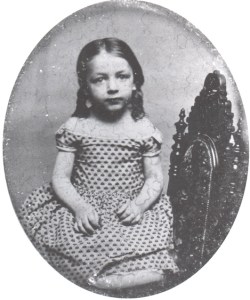General Joshua L. Chamberlain and a Fatherhood Journey

On October 18, 1864, Brigadier General Joshua Lawrence Chamberlain wrote a letter to his wife, Frances Caroline. This letter – though written during the war period – is unique and gives a glimpse of fatherhood, rather than war.
Chamberlain is usually remembered for his famed and pop-culturalized defense of Little Round Top at Gettysburg or for leadership moments at Petersburg or Appomattox. However, the battlefield accounts and legends about this officer only reveal part of the man. Joshua L. Chamberlain was a complex historical figure – humble and self-promoting, conservative and liberal, warrior and father.
This particular letter, penned during a trip to his parents’ home in Brewer, Maine, details the journey of a father and his son. Chamberlain was in Maine, still recovering from his “death-bed” injuries sustained at Petersburg in June, but was able to make the trip to the family home via steamer, visiting friends along the way. Harold Wyllys – the general’s six year old son – went along on the excursion, and some of the letter reports on his behavior and appearance, undoubtedly to please his mother. Apparently, Wyllys’s older sister, Grace “Daisy”, stayed home.

Given Wyllys’s age and the regular emphasis on his appearance and clothes, it is very possible that he had just made the style transition to trouser pants. During this era, children under the age of five or six wore “dresses” or gowns and often hair to their shoulders; some of this was style, much of it was practicality for taking care of little ones and their physical needs. The trip with dad and frequent mention of clothes suggests that young Wyllys had started a new stage of his life and had probably begun wearing “little boy’s clothes” instead of toddler outfits. Perhaps he even had a military-inspired suit which was a popular style for young boys during the war era and typically patterned off a loose-fitted Zouave uniform.
We think of Civil War generals as battlefield commanders and military soldiers, but most were volunteer warriors with civilian pursuits and families waiting for them and the conflict’s end. General Chamberlain unashamedly gave a glimpse of his role as a father with proud, memorable moments and examples of the less desirable occurrences encountered by parents through history’s eras.
(Spelling, punctuation, and emphasis is original; paragraph breaks added for easier reading.)
Dear Fanny,
I have the honor to report that I arrived safely here with my staff-officer, your much respected son. I found him a real hero. His conduct, and I judge, his appearance, too, made him a conspicuous object of interest and attention all along our route. Of course I found “Missy” Libby at the depot waiting for me. Mr. and Mrs. Libby were away, but Miss Katie made a beautiful hostess. She and her friend Miss Stelle seemed very much devoted to Wyllys. Also John Brown and Phil who called in the evening. He called on Mrs. Bacon and Wyllys became perfectly absorbed over their magnificent parrot. He had her out of the cage in short order, and seemed more amazed at the parrot’s performances, scolding, crying, singing, laughing, whistling, and then he was at the antics of William Eaton’s dog.
Wyllys behaved like a perfect gentleman at all places, and made the wonder of every body in the steamer. “He looked like a little prince,” says John C. by the way he kept me out on the deck till after midnight looking at the ships and ports and lighthouses we passed, and by that time the sea was pretty bright.
He looked rather pale and I put him to bed. He said he wasn’t sick resenting the intimation with expression of contempt, but admitted that the “drinking” of the boat “hurt” his stomach. Pretty soon he turned over in his berth and deposited his supper and dinner too I should think upon the pillow and bed. I came to his assistance with a bowl. He then lay quietly (after I had adjusted the bedding) and to my frequent inquiries the little hen answered “no, dear, I feel pretty well” and so he lay like a lamb or a hero; just as you please! till he woke me at dawn banging open the state room window to look at the sea.

We have a great many callers and his behavior and dress call forth much praise. Today he is not to be seen. Having devoted himself to helping his grandpa gather turnips so that he can drive the horse, he excuses himself to all visitors. Mother is suffering from neuralgia. She and Sae [Chamberlain’s sister Sarah] send much love, and regret that you did not come. Everybody enquires for you most kindly. Daisy is much loved in this region I find. Dr. Harris thinks she behaved wonderfully.
I was dragged into a great meeting of the Christian Commission at Norembega Hall on Sunday evening. I sat till I didn’t know whether I had any brains or not and then had to get up and say something. Don’t you pity me? My cold troubles me – irritates my wounds and spoils my appetite, but I am having a pleasant visit. Expect to be home Friday but may not come till Saturday don’t expect us till then.
Lawrence
Source:
Chamberlain, J.L., editor T. Desjardin. Joshua L. Chamberlain: A Life in Letters. Oxford: Osprey Publishing, 2012. (Pages 226-228)

I have written about my great grandfather who served with the 155th Regiment NYV and did an 8 month stay in Libby, Salisbury and other Confederate prisons. As a result he came home a broken man and had a strong negative influence on my ancestors right down to me. We lost a generation of family progress toward the American dream because of the war. I very much appreciate Sarah’s writing as the war’s influence on community and family is rarely narrated and almost never with the deft touch of Ms. Bierle.